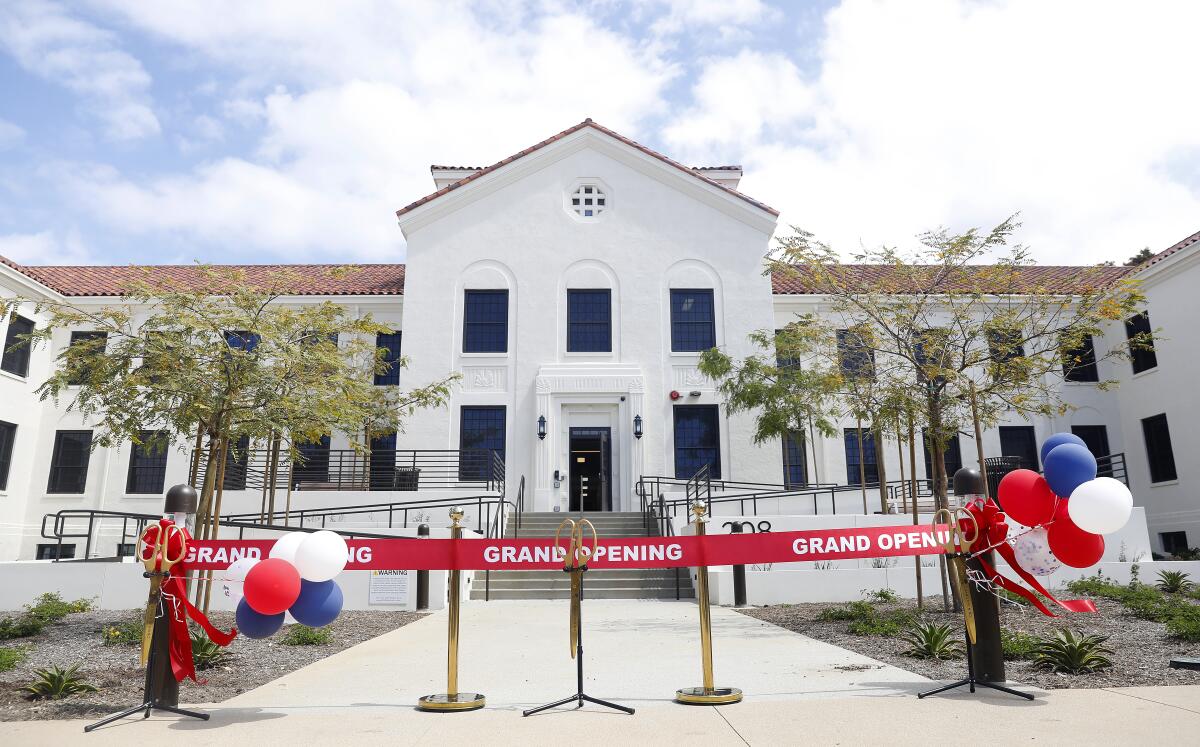VA housing policy discriminates against disabled veterans, federal judge rules

- Share via
The Department of Veterans Affairs discriminates against disabled veterans by outsourcing construction on its West Los Angeles campus, rendering some ineligible for housing because their incomes are too high, a federal judge has ruled.
The outside housing developers rely on tax credit financing that includes income eligibility requirements. The government compensation that veterans receive based on the severity of their injuries counts as income, excluding those who need housing the most, the plaintiffs in a class action lawsuit argue.
On Sunday in a partial summary judgment in the lawsuit, U.S. District Judge David O. Carter wrote that the outsourcing “facially discriminates against veterans based on their disabilities.” Carter said he would hear evidence at a later date to determine the appropriate remedy.
The plaintiffs’ lead attorney, Mark Rosenbaum of Public Counsel, said the ruling has national significance because the VA follows the same practice at its facilities across the country of working with third-party contractors who rely on sources of capital that require them to set income limits for housing.
In his partial summary judgment, Carter also rejected the government’s motion to dismiss the case, reaffirming an earlier ruling that the VA has “enforceable fiduciary duties to veterans” under the 1888 deed that transferred the property to the federal government.
The decision amended a tentative ruling Carter distributed before a July 9 hearing in which he said that the discrimination complaint, like other issues in the case, should be decided in a trial set to begin Aug. 6.
Other issues remaining for trial include the veterans’ demand that the VA provide thousands of units of additional housing on and near the campus and their contention that the VA has illegally leased portions of the 388-acre campus for activities that do not primarily benefit veterans and their families.
The plaintiffs in the class action — some of whom live in a tiny home village on the VA campus — presented evidence that they were prevented from moving into newly built or rehabbed housing because their disability income exceeded the limits set by the funding sources. It is unknown how many veterans qualify as plaintiffs, Rosenbaum said.
One of the plaintiffs, Deavin Sessom, a 100% disabled Army veteran who receives medical care at the VA, lives in the tiny home village but has been rejected for permanent housing because his disability compensation and Social Security combined exceed the eligibility limit.
That limit varies from building to building. In his ruling, Carter gave an example of a veteran receiving $40,000 in benefits who would be ineligible for an apartment requiring an income of no more than 30% of the area’s median income, or about $25,000. Some buildings on the VA campus have limits of up to 60% of area median income.
Carter concurred that “the more disability benefits that a veteran receives (i.e., the more disabled they are), the higher their “income” is, and the less likely they are to receive housing on the Grounds.”
“Defendants cannot outsource discrimination,” he wrote.
Rosenbaum said there are three potential solutions: The VA could build the housing itself, subsidize the housing to avoid income limits or simply stop counting disability compensation as income.
During the July 9 hearing, attorneys for the Department of Justice said the VA does not have the authority to build housing and would require congressional approval to begin doing so. A Department of Justice spokesperson said the agency had no comment on the ruling.
The lawsuit reprised an earlier one that ended with a 2015 agreement by the VA to build 1,200 units of housing on the campus, with a commitment to complete more than 770 units by the end of 2022. Only 54 of those units were completed by the deadline, and by September 2023, only 233 were available.
The new lawsuit, filed in November on behalf of the veterans by Public Counsel, the Inner City Law Center and two private law firms, alleges that the VA has reneged on its responsibility to veterans by contracting with the outside housing developers, kicking off a process that is time-consuming and excludes some disabled veterans because of the income thresholds.
Construction is underway on 504 units, and 234 units are in pre-development, with tens of millions of dollars in financing commitments, according to the Veterans Collective, a team of housing developers and service providers contracted by the VA to build at least 1,200 units on the campus.
“We hope this issue, which is out of our control, would not hinder our ability to move forward,” the Veterans Collective said in a statement.
The Veterans Collective supports legislation that would undo a policy it contends comes from the U.S. Department of Housing and Urban Development.
Carter in December denied the government’s first motion to dismiss the case, and in May certified the case as a class action on behalf of all homeless disabled veterans with serious mental illnesses or traumatic brain injuries.
The motion for summary judgment, filed by the plaintiffs in May, argued that there was no material dispute that the income rules block access to those most in need.
“The exclusion of fully disabled veterans ‘who, by their service, would most benefit being in these units’ is manifestly unjust,” plaintiffs’ attorneys wrote.
More to Read
Sign up for Essential California
The most important California stories and recommendations in your inbox every morning.
You may occasionally receive promotional content from the Los Angeles Times.











